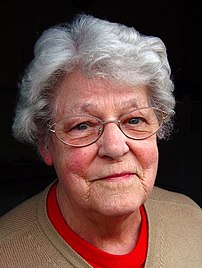 Image via Wikipedia Aging signs do not only include wrinkles, brittle bones and health problems, but also weakened eyes. As we grow older, our eyes lose the ability to focus well on near objects. The lens has a decreased capacity to increase its power and change its shape to accommodate the clear vision of near objects. This aging sign is technically called presbyopia which sets in usually at 40 and manifests as the inability to read comfortably at a close distance. By this time we would be either wearing reading glasses or moving the book as far away as 25 cm from our eyes so we can read the text clearly.
Image via Wikipedia Aging signs do not only include wrinkles, brittle bones and health problems, but also weakened eyes. As we grow older, our eyes lose the ability to focus well on near objects. The lens has a decreased capacity to increase its power and change its shape to accommodate the clear vision of near objects. This aging sign is technically called presbyopia which sets in usually at 40 and manifests as the inability to read comfortably at a close distance. By this time we would be either wearing reading glasses or moving the book as far away as 25 cm from our eyes so we can read the text clearly.Or we can have Lasik eye surgery and be done with it.
An eye surgery can be beneficial in the long run. Presbyopia is not the only problem we'll be running into as we age and our eyes weaken considerably. Cataracts and glaucoma can lead to blindness if not corrected through eye surgery. However, it is presbyopia that will eventually affect all of us as we reach the golden age of forty.
Greek for the aging eye, presbyopia is a natural occurrence that starts around age 10 and affects nearly everyone by age 40. It is an age-related process where the eye’s lens becomes less flexible. According to the Contact Lens Council, more than 4 million people are diagnosed with presbyopia each year, making presbyopes the fastest-growing demographic segment requiring vision correction. (What is Presbyopia? April 2008)
![Reblog this post [with Zemanta]](http://img.zemanta.com/reblog_e.png?x-id=0f80566e-3438-4cda-bb28-261723e0ddaf)
Comments
Post a Comment
Tell me what you think.